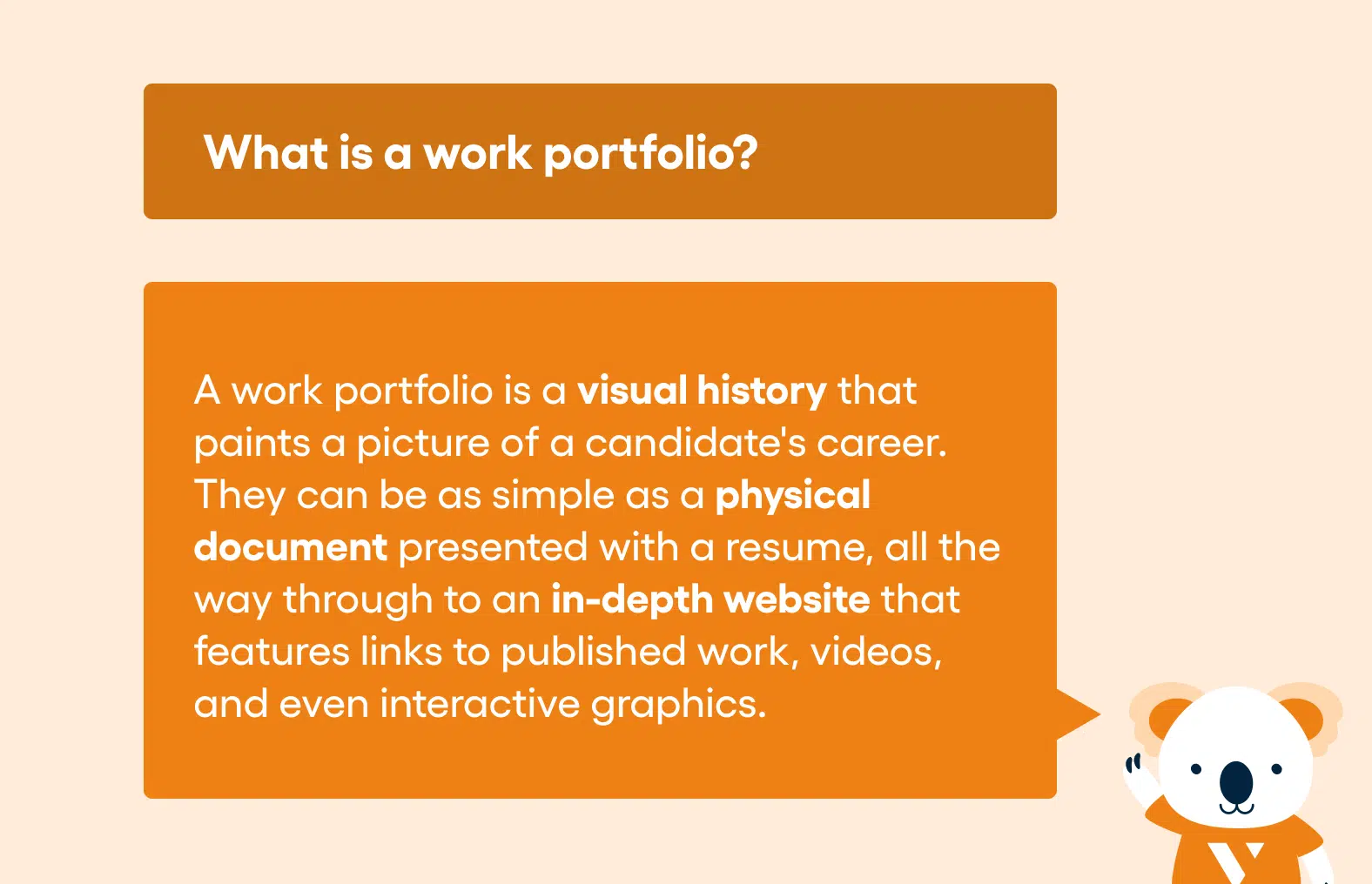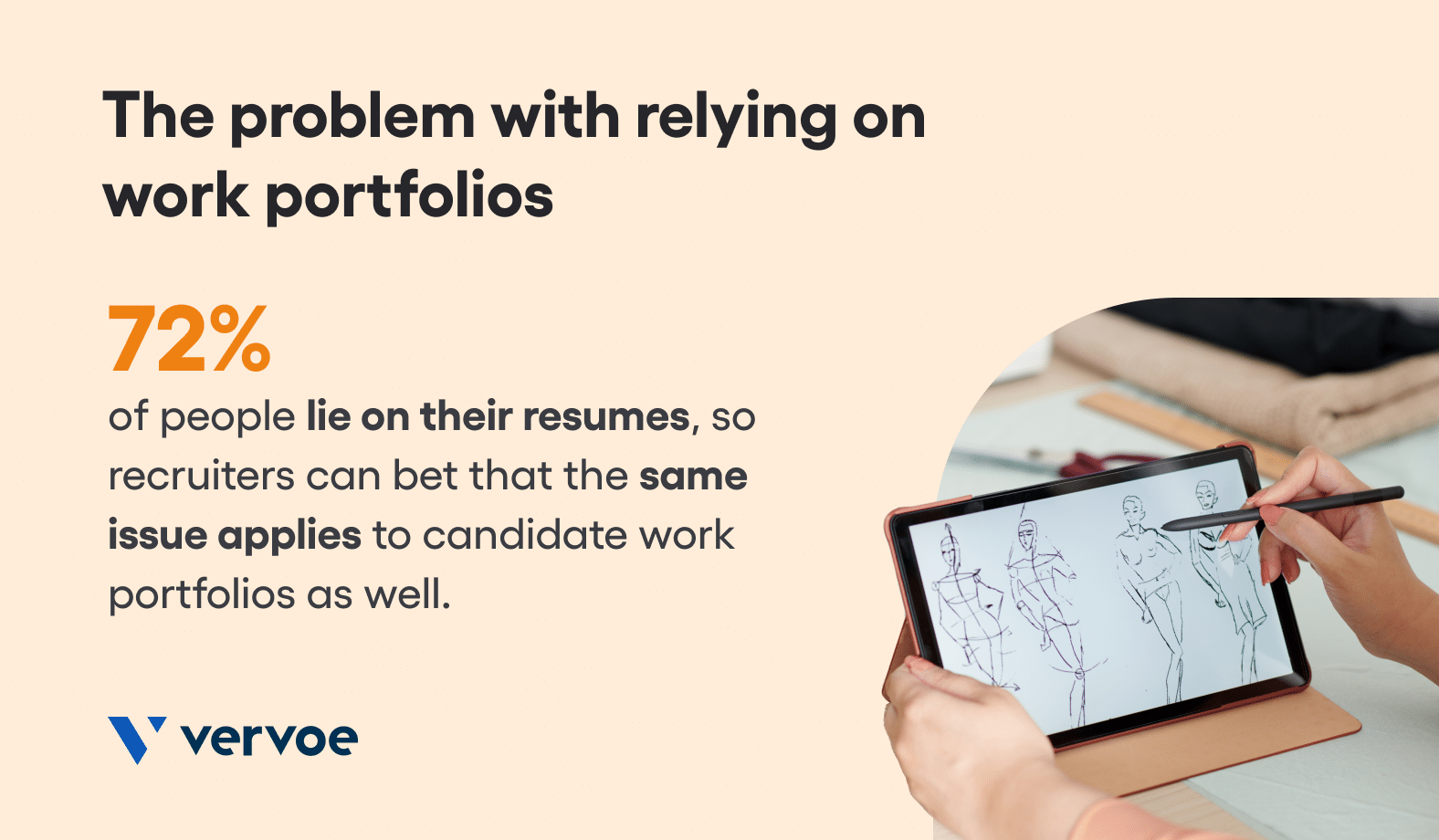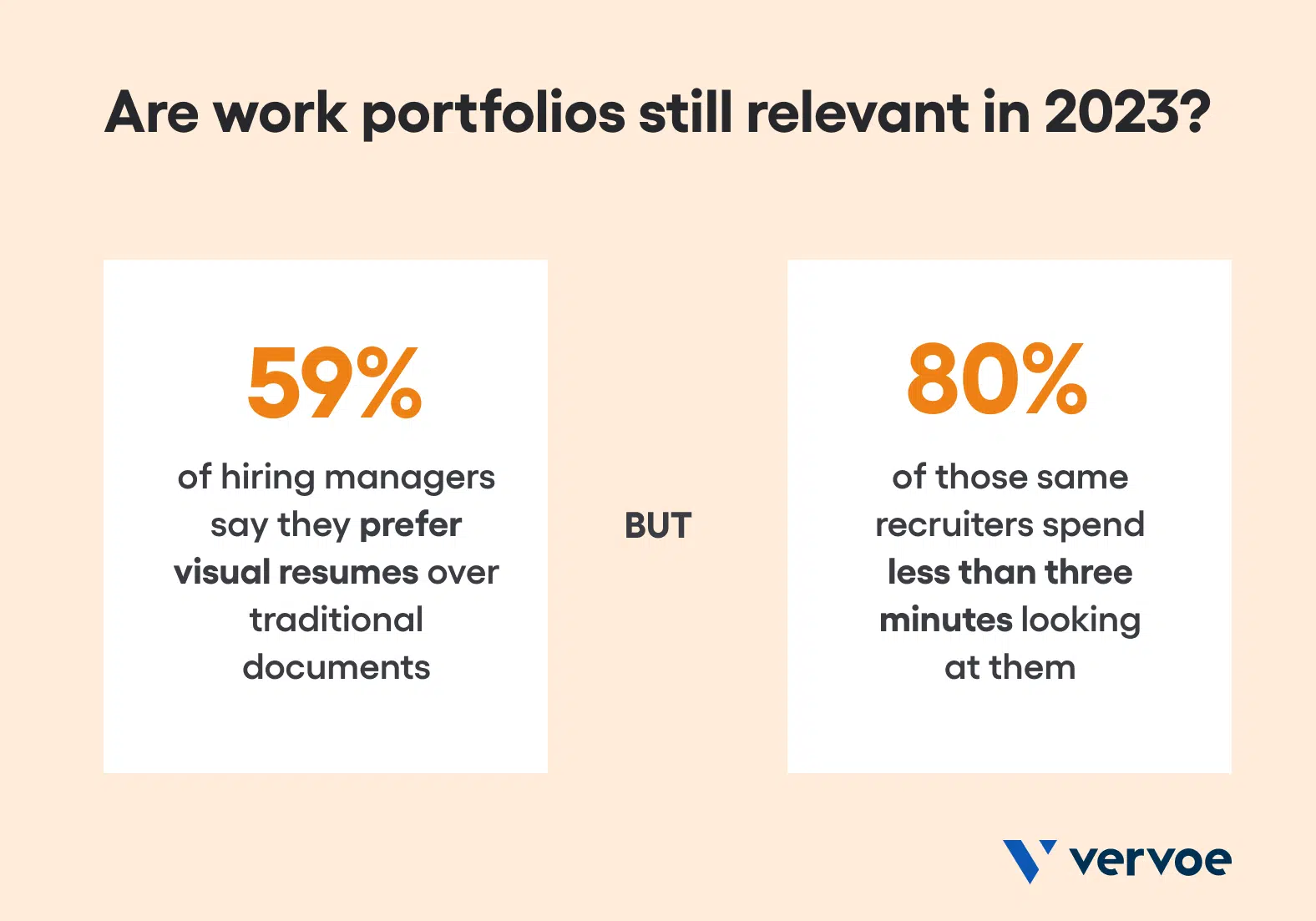From test driving a new car to accepting a bite of free cheese at your local deli, there’s no denying that most of us love samples – but why exactly is that?
In most situations, samples are used as examples. Conclusions drawn from samples are intended to be snapshots of the big picture, and the information drawn from a sample is inevitably used to make decisions for the future.
In the world of recruitment, one of the most common tools that hiring managers use to “sample” a candidate’s background and skill level is through work portfolios.
Although not applicable to every industry or position, they are usually served up by candidates as a tool to showcase examples of their previous projects. The question is, are they still relevant in 2023?
What is a work portfolio and who uses them?
From the perspective of a candidate, a work portfolio provides them with an opportunity to showcase their skills, experience, and talents in a visual format – information that a standard resume or cover letter simply doesn’t convey.
In contrast, a career portfolio instead provides concrete evidence of a candidate’s previous work, symbolizing a career highlight reel.
Not so long ago, job seekers in the creative industries were generally the only people who used work portfolios to paint a picture of their careers.
Today, pretty much any job that values creativity, innovation and measurable results can benefit from using a work portfolio, and is now common in the realms of sales, finance, and even engineering.
Generalized personal information, evaluations, sample work, a business portrait, and awards and acknowledgments should all be included on a work portfolio, but the format in which this is presented will often vary.
Depending on a candidate’s industry or background, a career portfolio can be as simple as a physical document presented with a resume, all the way through to an in-depth website that features links to published work, videos, and even interactive graphics.

The problem with using work portfolios to assess candidates
If a candidate has put in the time, energy, and resources to include a world-class work portfolio with their application for a position, it’s fair to say that they obviously want the job.
For recruiters, these are often considered to be one of the easiest ways to assess an applicant’s past performance and work examples – but what if it’s not a true reflection of their background at all?
In 2023, 72% of ResumeBuilder survey respondents indicated that they had lied on their resume. The biggest fib was about their education, with 44% of respondents saying they stretched the truth regarding their academic bona fides. Years of experience marked the second biggest falsehood, with skills or abilities coming in third.
With skills-based hiring on the rise across almost every industry, embellishments tied to a candidate’s abilities – or lack thereof – are one of the biggest challenges recruiters face when conducting a work portfolio review.
If the candidate has presented the work as their own, surely this must count as skills validation, right?
Wrong.
If almost three-quarters of people lie on their resumes, you can certainly bet that the same concept applies to work portfolios. In an era when it’s never been easier to outsource through the likes of Fiverr or Airtasker, who’s to say that someone else didn’t complete the work?
For recruiters looking for a way to separate fact from fiction, this is where the power of skills testing comes in.

How job simulations help to separate fact from fiction
Like it or not, the only way to truly validate a candidate’s skills is to see them perform on the job. Aside from paid trials, skills assessments are the only weapons in a recruiter’s arsenal that are capable of this task.
Let’s say that you’re looking to hire a copywriter, and have a nice pile of candidates to choose from. Intuitively, you’re drawn to applicants who have included a work portfolio in the form of a website that links to examples of their work, such as blogs or landing pages.
From your talent pool, statistics show that there’s going to be at least a handful of applicants who have embellished their backgrounds, and that can include the work samples included in their career portfolio.
To determine who possesses the skills you’re looking for versus who might be stretching the truth, the solution is to use skills assessments that feature job simulations.
While it’s your choice whether or not to use work simulations at the very start of the hiring process, or at the later stages when you’re down to two or three top candidates, skills testing is a concept that separates those who can talk the talk from those who can walk the walk.
To understand how job simulations work during the recruitment process, Vervoe uses machine learning to screen candidates in, and not out. Our AI-powered platform uses a unique, efficient multi-layered skills testing approach to match candidates with the preferences of the employer.
Not only does this help to streamline the recruitment process while staying compliant, but skills testing methods that include work simulations are a failsafe way to verify that candidate’s can do what they say they can – even if they’ve included a work portfolio as a part of their application.
What are the three key considerations in evaluating a candidate’s portfolio?
According to a study by Adobe, 59% of hiring managers prefer visual resumes like work portfolios over traditional text-based resumes.
While this might sound great for applicants who already have one, the other major consideration is that an eye-watering 80% of recruiters say they spend three minutes or less on a candidate’s portfolio.
Fundamentally, recruiters and hiring managers are busy people and under a lot of pressure to get results. Often faced with an avalanche of resumes and the task of sorting through them, applications that include a career portfolio may help a candidate to stand out, but only if the content is relevant.
If you work in the recruitment space and this sounds familiar, how do you assess a candidate via their career portfolio, and are there any key metrics to consider?
As a general rule, the following three factors will help you to identify top talent – but only when used in conjunction with work simulations to verify these skills.
Relevance
A candidate’s portfolio might look great, but if it isn’t relevant to the job or industry they’re applying for, then what’s the point? As such, the first thing to assess is if the portfolio showcases the skills and experiences that are applicable to the job you’re recruiting for.
As an example, candidates applying for a Digital Marketing Coordinator role should be able to showcase their past marketing campaigns, social media strategies, results sourced from analytics, and other relevant materials.
Creativity
Dubbed the most “in-demand soft skill for 2020” by LinkedIn, almost every sector can benefit from new hires with strong creativity. Therefore, any candidate portfolio review should take into account the levels of creative skills an applicant possesses.
Candidates who use generic tactics or designs, or fall into the trap of adding every project they’ve ever done, may not score highly on originality. Instead, look for work portfolios that show the ability to think outside of the box while being able to creatively solve problems.
Results
While a relevant and creative work portfolio will usually catch the attention of a recruiter, the simple fact is that these rarely amount to anything unless a candidate is able to show that they can deliver real and tangible results.
The portfolio should directly demonstrate how a candidate’s specific skills and efforts contributed to achieving business goals, driving growth, or solving problems. When making hiring decisions, this is a key element that can help identify applicants that have the potential to add value to an organization.

Talent stands out with job simulations
Vervoe is an end-to-end AI-powered solution that is proudly revolutionizing the hiring process through skills testing, job simulations, and machine learning. By empowering businesses to create assessments designed to suit the specific requirements of a role, Vervoe predicts performance that showcases the talent of every candidate.
By assessing an applicant’s ability to perform the role through a skills assessment, our job simulations focus on the work — and not the person. To see people do the job before they get the job, book a demo today and let our experienced team run you through Vervoe’s full range of hiring solutions.


















